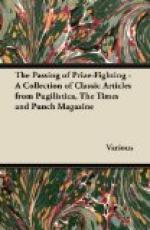How do you suppose a woman like HERMIONE succeeds as she does? Why she finds out (it doesn’t take long, I assure you) the weak points of the men she meets; their wretched jealousies, affectations and conceits, and then artfully proceeds to flatter them and make each of them think his particular self the lord of creation, until she has all the weak and foolish creatures wound round her little finger, and slavishly ready to fetch and carry for her. And all the time you go about and boast of your conquest to one another, and imagine that you have subjugated her. But she sits at home and laughs at you, and despises you all from the flinty bottom of her heart. Bah! you’re a pack of fools, and I’ve no patience with you. As for you personally, if you must write any more, tell your fellow men something about their own follies. It won’t be news to us, but it may open their eyes. If you can’t do that, you had better retire into your tub, and cease your painful barking altogether. I’ve got my eye on you, so be careful. I remain (thank goodness)
A WOMAN.
* * * * *
Now that was not altogether an agreeable breakfast dish. And the worst of it was that it was so supremely unjustifiable. Had my indignant correspondent honoured me with her address, I should have answered her at once. “Madam,” I should have said, “your anger outstrips your reason. I always intended to say something about men. I had already begun a second letter to my friend VANITY on the subject. I can therefore afford to forgive your hard words, and to admit that there is a certain amount of truth in your strictures on us. But please don’t write to me again so furiously. Such excessive annoyance is quite out of keeping with your pretty handwriting, and besides, it takes away my appetite to think I have even involuntarily given you pain. Be kind enough to look out for my next letter, but don’t, for goodness’ sake, tell me what you think about it, unless it should happen to please you. In that case I shall, of course, be proud and glad to hear from you again.”
I now proceed, therefore, to carry out my intention, and, as usual, I address myself to the fountain head. My dear VANITY, I never shall understand why you take so much trouble to get hold of men. They are not a pleasing sight when you have got them, and after a time it must cease to amuse even you to see yourself reproduced over and over again, and in innumerable ridiculous ways. For instance, there is Dr. PEAGAM, the celebrated author of Indo-Hebraic Fairy Tales: a new Theory of their Rise and Development, with an Excursus on an Early Aryan Version of “Three Blind Mice.” Dr. PEAGAM is learned; he has the industry of a beaver; he is a correspondent of goodness knows how many foreign philosophical, philological, and mythological societies; his record of University distinctions has never been equalled; his advice has been sought by German Professors. Yet he carries all this weight of celebrity and learning as lightly as if it were a wideawake, and seems to think nothing of it. But he has his weak point, and, like Achilles, he has it in his feet.




